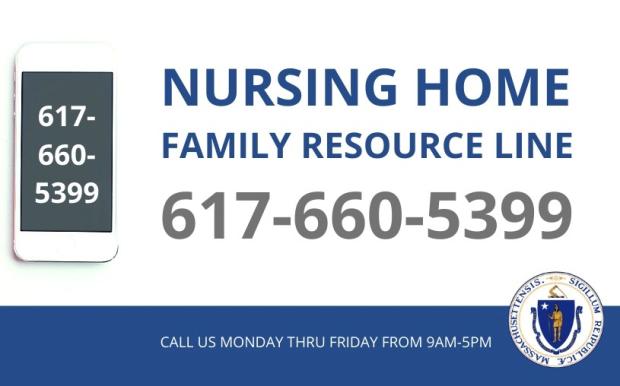Nursing Home Family Resource Line
The Nursing Home Family Resource Line at (617) 660-5399 is a dedicated phone line to connect family members and loved ones of nursing home, rest home, and assisted living residents with the information and resources they need. This phone line provides one central contact for families and community members who have questions about the care their loved one is receiving during the COVID-19 outbreak.
The Nursing Home Family Resource Line is staffed Monday through Friday from 9:00 AM – 5:00 PM. Staff can respond to questions on a range of topics and coordinate across state agencies to help provide answers.
COVID-19 vaccine information
The Commonwealth has prioritized protecting the most vulnerable populations, including long-term care (nursing home, rest home, and assisted living) residents and staff. Vaccinating long-term care facility residents, staff, and visitors against COVID-19 is a crucial step in preventing the spread of COVID-19. Long-term care facilities in partnership with their contracted pharmacies will be able to provide their residents with necessary doses of the COVID-19 vaccine.
Families with questions regarding how their loved one will receive their updated COVID-19 vaccine should reach out to their loved one’s facility.
For additional questions about the care your loved one is receiving, please call the Nursing Home Family Resource Line at (617) 660-5399. The Nursing Home Family Resource Line is staffed Monday through Friday from 9:00 a.m. – 5:00 p.m. Staff will field questions on a range of topics and coordinate across state agencies to help provide answers.
Where can I get more information?
Visit these frequently updated web pages on COVID-19 vaccination:
Temporary admissions freeze
On November 6, 2020, the state announced that it would require certain high risk nursing homes and rest homes to temporarily stop all new admissions to protect the health and safety of residents and prevent further COVID-19 transmission.
Stopping admissions enables homes to focus resources such as staff and PPE on the health and safety of its current residents and enables the home to stabilize before taking on new residents. Homes that meet certain criteria are required to stop any new admissions until the Department of Public Health has determined that conditions have improved and the facility is ready to safely care for new residents. The Commonwealth will work closely with homes during this time and provide supports as needed to ensure resident health and safety.
There are a number of reasons why a facility may be required to stop admissions, and the situation in each facility is different. Some of the factors the state uses to make this decision include:
- Number of new COVID-19 cases within the facility
- Infection control survey results
- Facilities are required to notify residents’ designated family members and/or representative when the facility is subject to an admissions freeze. In addition, a list of facilities that are currently required to stop new admissions and the reason for this admissions freeze will be updated on Friday afternoons, and as needed when the Department of Public of Health determines a facility can be removed.
If you have further questions about why your loved one’s facility has been required to stop new admissions, please reach out directly to the facility or the Family Resource Line.
Infection control
The Department of Public Health performs regular, in-person infection control surveys to make sure nursing homes and rest homes are meeting infection control standards. They ask questions, observe staff and management activities, and make sure infection control and safety protocols are being followed.
Deficiencies are assigned a letter based on the severity and scope of the issue identified during the survey; L is the most serious deficiency (very severe, affecting all residents). When a deficiency is identified during a survey, the facility must promptly submit a plan of correction to address the deficiency and are re-surveyed to make sure they have corrected the issue. DPH works with facilities and provides supports to properly address deficiencies when necessary.
Nursing home consumer information
Information on long-term care options in Massachusetts, individual nursing homes, resident rights and other resources can be found on the Nursing Home Consumer Information webpage. This webpage includes:
- The Nursing Home Survey Performance Tool - a state resource which includes DPH quality scores on an individual facility’s administration, staffing, resident rights, food services, and environmental categories
- Nursing Home Compare - a federal resource from the Centers for Medicare and Medicaid (CMS) that contains detailed information about nursing homes nationwide, including their CMS five-star quality rating
- Ombudsman Programs - advocacy programs available for or on behalf of residents at assisted living facilities, long-term care facilities and those in community care. The ombudsman service offers a way for older adults and their loved ones to voice their complaints and have concerns addressed so they can live with dignity and respect. See below for specific ombudsman types and contact information:
- Long-term care Ombudsperson: advocates for residents of skilled nursing facilities and rest homes | Carolyn Fenn, Carolyn.Fenn@mass.gov
- Assisted Living Ombudsperson: advocates for residents of assisted living residences | Donna Bucca, Donna.Bucca@mass.gov
- Elder Affairs Community Care Ombudsperson: assists older adults with issues related to community- based resources (home care, chore services, housing search support, health insurance guidance and care giver support) | Karyn Wylie, Karyn.wylie@mass.gov
- EOHHS Ombudsperson: Assists constituents with issues related to EOHHS agencies | Marylouise Gamache, Marylouise.gamache@mass.gov
State supports for nursing homes to protect resident safety
The Commonwealth continues to support the safety of residents and staff in nursing homes and rest homes following the COVID-19 public health emergency, including:
- Providing personal protective equipment (PPE) when needed
- Delivering testing kits for residents and staff to use when they have respiratory virus symptoms or following an exposure
- Deploying nursing staff when the facility needs support to maintain safe resident care during a COVID-19 cluster
- Onsite visits in response to filed complaints and concerns for resident care and safety
